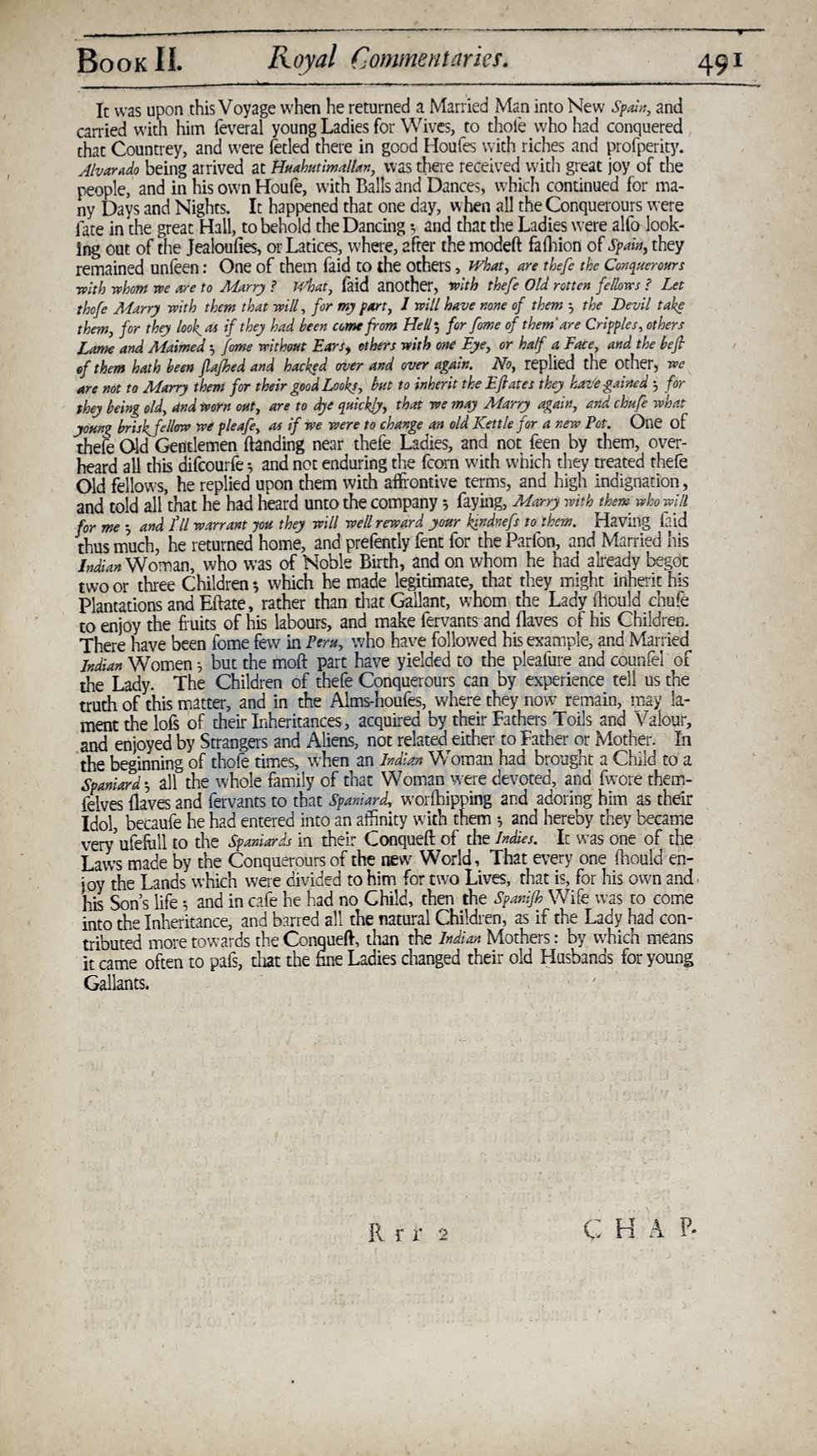

BooK
U.
Royal
Commentaries.
Ic was upon .this Voyage when he returned a Man:ied Man into New
Spain,
and
carried with him feveral young Ladies for Wives, co thofe who had conquered
chac Councrey, and were fecled chere in good Houfes with riches and profpericy. '
Alvar11d,o
being arrived ac
Huahutimallan,
was there received wich greac joy of che
people, and in his own Houfe, with Balls ánd Dances, whith contínued for ma–
ny Days and Nighcs.
lt happened thac one day, when
all
che Conquerours were
[are in che greac
HlL~
to b€hold che Dancing ; aad chat che Ladies were alfo look–
lng
out
of che Jealouíies,
ov
Latices, where, 2frer che modeíl: fafüion of
Spain,
chey
remained unfeen: One of them faid to ihe others,
what, are rhefa the Conquerours
with whom we are to Marry? What~
faid anocher,
with thefa O!d rotten fe!lows? Let
-thofe Marry with them that will, for
my
put,
1
will h11ve none of them
;
the Devil takf
·
them, for they look.,
tú
if
they had been
c~me
from Hell; for fome
of
them
·
are Cripples, others
Ldme and Maimed; Jume without Ear}; othefs wirh one Eye, or ha!f a Fate, and the beft
,,f
the1fl ht11th 'been Jlafhed and hack.;d over and over ag¡zin.
No,
replied die orher,
wc
ttre
nót to Marry them for their good Look¿,
1
éut to inherit the Eftates they have-gained; for
ihey being o!d, dnd wotn out, are to dye quickjy, that we
may
Marry again, and ch'ufe what
.young bri1k_fellow wipleafe,
.u,
if
we
were to change ~n o!d Kettle for a new Pot.
One of
.the[e Old Gef!t!ernen_ frandmg neat' thefe Lad1es, -and nor feen by 1:bem, over–
heard
aU chis
difcourfe; and nor endming nhe
frorn
wirh which they treai:ed rhere
Old fellows, he replied upon them with affi-mttive terms, and high indignaríon,
and told all that he had heard unto the company ; faying,
Marry with
them whowilt
for me
;
and lll warrant 7ou they will well reward y.our kjnd11efs to them.
Hav-ÍJ.igfaid
chus much, he returned home, ánd' pr.efently fenn for che Parfon, and Married his
lndian
Woman,.who was
of
Noble Birrh, ánd o.n whom he had ah'eady begoc
two or three Children; which h@ made legitimare, tl;iar they mighr inbfüit his
Plantations and Eíl:ate, rath~r than that Gallant, whom, the Lady ílhould chufe
to
enjoy the fruits of his labours, and make fervams·and ílaves of his Ghildren.
There have been fome
few
in
Peru,
who havé followed bis exarnple, and
1
Marriea
Jndian
Wornen ; bue che moíl: pare have yielded to the pleafüre and coun[el ·of
the Lady. The Children of the[e Conquerours can by experience celf us che
truth of this matter, and in ene Alms-houfes, where nhey now remain, 1,na,y la–
.mene the lofs
of
their Inhericances, acquired by their Fachers Toils arnd Valour,
.and enjoyed by Srrangers and Aliens, not related eirher to Fa.rher or Mother.
rn
tbe
beginning of chofe times, when an
lndian
Woman had btought a Child to a
Sp1tniar4;
all che whole farnily of that Woman were ,dev.oted, and_fwore rhem–
felves ílaves and fervants ro rhat
Spaniard,
woríbipping and adoring him
a.s
théir
Idol, betaufe he had entered into an affiniry with them ; and hereby the,y became
very ufefull
_to
the
Spaniards
in their Conqueíl: of che
Indies.
le was one of tbe
Laws rnade by the Conquer,ours of rhe new World, That every one fhould en–
joy the Lands wHich were divided to him for two Lives, rhat is, for his own and ,
bis Son's life ; and in cafe he had no Child, chen the
Spanifh
Wife was to come
into che Inhet'itance, and barred all rhe natural Children, as if che Lady had con–
tributed more row¡irds che Congueft, than nhe
Jndian
Mothers : by which means
it carne often
to
pafs, chat the fine Ladies changed their old f)usbaads for young
Gallants.
·
·
·
.
\
R
rr
2
(.: H A P~
49
1














